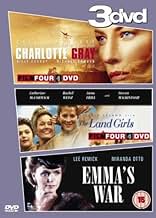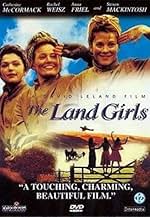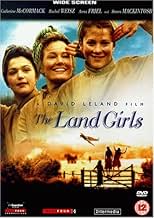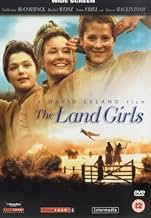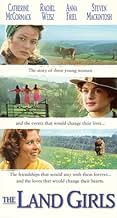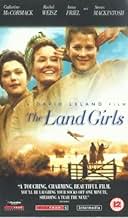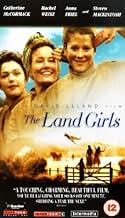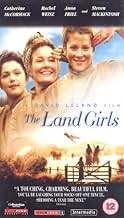VALUTAZIONE IMDb
6,2/10
2258
LA TUA VALUTAZIONE
Tre giovani donne di diversi ceti sociali si uniscono all'esercito di terra delle donne durante la seconda guerra mondiale e vengono inviate a lavorare insieme in una fattoria nel Dorset, do... Leggi tuttoTre giovani donne di diversi ceti sociali si uniscono all'esercito di terra delle donne durante la seconda guerra mondiale e vengono inviate a lavorare insieme in una fattoria nel Dorset, dove l'esperienza cambia la loro vita per sempre.Tre giovani donne di diversi ceti sociali si uniscono all'esercito di terra delle donne durante la seconda guerra mondiale e vengono inviate a lavorare insieme in una fattoria nel Dorset, dove l'esperienza cambia la loro vita per sempre.
- Regia
- Sceneggiatura
- Star
Recensioni in evidenza
Stella (Catherine McCormack), Prue (Anna Friel) and Ag (Rachel Weisz) play three "land girls", volunteers to carry on the agricultural work of the men. On the farm they find love, conflict, friendship and cows. The film is more of a relationship drama of those left behind than an account of the second world war.
That said it is an interesting piece - not only is it different to have a WW2 film from a British point-of-view but also from a woman's point of view. It is interesting to see how those left behind acted with their lives and their war efforts - how close to the truth this account is, anyone's guess, it's a bit unrealistic because so many girl's experiences are crammed into the story of these three. The story is good regardless with the tangled relationships creating the glut of the plot, however the many tangled love stories do get a bit much at times but the themes of love, loss and British spirit during wartime tend to make up for it.
The performance from the lead trio are mixed, Weisz is a bit stereotyped as an upper-class woman ("rotter", "jolly good" etc) but gets better as her character develops. Friel is good as Prue who starts as the roughest of the group but is touched by the events in her life. McCormack (Stella) is meant to be the core of the story with her interactions with the farmers, especially the son Joe (Steven Mackintosh), but she plays it a little over earnest for my liking. Mackintosh has the most complex role and carries it off very well with the best performance in the film.
The film's conclusion is a mix of neat, tidy endings and some more emotional moments that more realistically depict the damage that the conflict caused on the people left behind.
Overall the film is not amazing but is an interesting account of WW2 from a different point of view, some of the events are a little stereotyped and lack a realistic feel but generally the film carries the emotions that many will have experienced at the time.
That said it is an interesting piece - not only is it different to have a WW2 film from a British point-of-view but also from a woman's point of view. It is interesting to see how those left behind acted with their lives and their war efforts - how close to the truth this account is, anyone's guess, it's a bit unrealistic because so many girl's experiences are crammed into the story of these three. The story is good regardless with the tangled relationships creating the glut of the plot, however the many tangled love stories do get a bit much at times but the themes of love, loss and British spirit during wartime tend to make up for it.
The performance from the lead trio are mixed, Weisz is a bit stereotyped as an upper-class woman ("rotter", "jolly good" etc) but gets better as her character develops. Friel is good as Prue who starts as the roughest of the group but is touched by the events in her life. McCormack (Stella) is meant to be the core of the story with her interactions with the farmers, especially the son Joe (Steven Mackintosh), but she plays it a little over earnest for my liking. Mackintosh has the most complex role and carries it off very well with the best performance in the film.
The film's conclusion is a mix of neat, tidy endings and some more emotional moments that more realistically depict the damage that the conflict caused on the people left behind.
Overall the film is not amazing but is an interesting account of WW2 from a different point of view, some of the events are a little stereotyped and lack a realistic feel but generally the film carries the emotions that many will have experienced at the time.
Another very good example of an understated British flick being elevated by a strong cast into something worth notice. In a refreshing take on the WWII drama, the focus is on the ones who stayed behind in the war-torn south of England, like the farmers to feed the impoverished nation; the women to keep the factories running and, as in "The Land Girls", to work the land in place of the absent men.
Stephen Mackintosh, my favourite underrated Brit actor, gives the film's best performance as Joe, the farmer's son who wishes he was anywhere but home, but he's well supported by Catherine McCormack, Rachel Weisz and Anna Friel as the unfeasibly but mercifully smouldering girls of the Women's Land Army. Tom Georgeson brings gruff character as Mr Lawrence, the farmer, and check out an early Paul Bettany appearance.
Thousands of women found a new freedom in work during the War, but they were expected to return to their domestic, invisible lives once the men returned. "The Land Girls" is not cinema verité; and doesn't pretend to tackle the grimness my mother talks of in England in the 40s and 50s. But who cares? – when I want grim I'll watch a documentary; I'll settle back happily any day to watch fine actors in a quiet, 'little' film with gorgeous Dorset scenery (it really is that beautiful, visit if you can) and a tender story.
It will be too slow, too uneventful, for some. Perhaps they'd have preferred a blowsy Hollywood version, where Antonio Banderas plays the farmer's son and Renee Zellwegger the upper crust beauty (hooray for the ghost of a UK film industry). But I found it gentle and charming just as it was; and when the ingredients are so fine to begin with, that's good enough for me. If you like this sort of thing I recommend Powell & Pressburger's magical "Canterbury Tale".
Stephen Mackintosh, my favourite underrated Brit actor, gives the film's best performance as Joe, the farmer's son who wishes he was anywhere but home, but he's well supported by Catherine McCormack, Rachel Weisz and Anna Friel as the unfeasibly but mercifully smouldering girls of the Women's Land Army. Tom Georgeson brings gruff character as Mr Lawrence, the farmer, and check out an early Paul Bettany appearance.
Thousands of women found a new freedom in work during the War, but they were expected to return to their domestic, invisible lives once the men returned. "The Land Girls" is not cinema verité; and doesn't pretend to tackle the grimness my mother talks of in England in the 40s and 50s. But who cares? – when I want grim I'll watch a documentary; I'll settle back happily any day to watch fine actors in a quiet, 'little' film with gorgeous Dorset scenery (it really is that beautiful, visit if you can) and a tender story.
It will be too slow, too uneventful, for some. Perhaps they'd have preferred a blowsy Hollywood version, where Antonio Banderas plays the farmer's son and Renee Zellwegger the upper crust beauty (hooray for the ghost of a UK film industry). But I found it gentle and charming just as it was; and when the ingredients are so fine to begin with, that's good enough for me. If you like this sort of thing I recommend Powell & Pressburger's magical "Canterbury Tale".
Beautifully photographed in the English countryside, this odd film about three English women assigned to work on a farm during World War II provides the promise of heat but never delivers. None of the characters (perhaps the director should have focused on fewer characters to provide proper depth) nor the relationships between the characters are remotely believable. This film exhibits a dangerous trend in films today where the mentality of the 90's is transposed onto the 40's. Directors and screenwriters would be well advised to do more homework on the period in which their films take place. Further, good acting and excellent production values cannot overcome a mediocre script or lackluster direction.
Land Girls is about a British program during World War II that trained women from all over the country to work on farms while the men were at war. Stella, Ag and Prue are three young women from different areas and different classes who go to work on an old farm in south-coastal England. But this isn't a "fish out of water" kind of film - the women adjust reasonably quickly and become part of the family. There is a the crotchety farmer, helpful farmer's wife and good looking son who plans to join the RAF. The war feels generally a bit remote - the young women can see bombing from a hilltop, but aren't in the middle of the fighting.
The movie focuses on Stella, who's engaged to a young man at a nearby naval station. Prue is the somewhat adventurous hair stylist-turned-cow milker, and Ag is a university student off to help her country. Strongly recommended for folks who enjoy realistic settings and anything about World War II home life.
The movie focuses on Stella, who's engaged to a young man at a nearby naval station. Prue is the somewhat adventurous hair stylist-turned-cow milker, and Ag is a university student off to help her country. Strongly recommended for folks who enjoy realistic settings and anything about World War II home life.
I always love period dramas, especially films that focus on women and their friendships but this movie left me wondering what the point was after two hours. The three girls come to work on the farm with three totally separate personalities. You have Prue the party girl, Ag the uptight college girl, and Stella who is supposed to be the mainstay of the entire movie, the sensible one. In fact, it is Stella who narrates the movie and opens it with how she moved to the farm to help and be closer to her fiancee. So we establish that she's committed and in love with her fiancee, but within the first 30 minutes, she's falling in love with the farmhand Joe, even after saying how unspeakable he is, for no good reason. Worst of all, the reason is never explained on how she fell out of love with her fiancee and fell in love with Joe. And she seems to have no problem with Joe falling in love, or at least in bed, with everyone else around her. The movie did not make sense to me at that point. Still it is a quiet film with gorgeous English scenery and if you just want a movie that focuses on friendship, then this is the movie for you. I watched it once and that's enough.
Lo sapevi?
- QuizThe Reverend Alan Bennett, seen conducting the christening near the end of the film, is the actual Rector of the church where the scene was filmed.
- BlooperWhen Stella receives a phone call from her fiancé, she tells him that the "pips" are going and that he should insert more money to continue the call. The "pips" did not come in until 1959. Prior to that local calls were unlimited in duration and long distance calls were via the operator, who would announce when your time was up and you needed to insert further coins.
- Colonne sonoreSpeed the Plough
Written by John Kirkpatrick, Michael Gregory (as Mike Gregory) and Howard Evans
Performed by The Albion Dance Band from Larkrise to Candleford
Published in the UK by Concorde International Management Consultants Ltd.
By permission of Leosong Copyright Service Ltd.
I più visti
Accedi per valutare e creare un elenco di titoli salvati per ottenere consigli personalizzati
- How long is The Land Girls?Powered by Alexa
Dettagli
- Data di uscita
- Paesi di origine
- Lingua
- Celebre anche come
- The Land Girls
- Luoghi delle riprese
- Aziende produttrici
- Vedi altri crediti dell’azienda su IMDbPro
Botteghino
- Lordo Stati Uniti e Canada
- 238.497 USD
- Fine settimana di apertura Stati Uniti e Canada
- 20.921 USD
- 14 giu 1998
- Lordo in tutto il mondo
- 238.497 USD
- Tempo di esecuzione
- 1h 51min(111 min)
- Mix di suoni
- Proporzioni
- 2.35 : 1
Contribuisci a questa pagina
Suggerisci una modifica o aggiungi i contenuti mancanti


